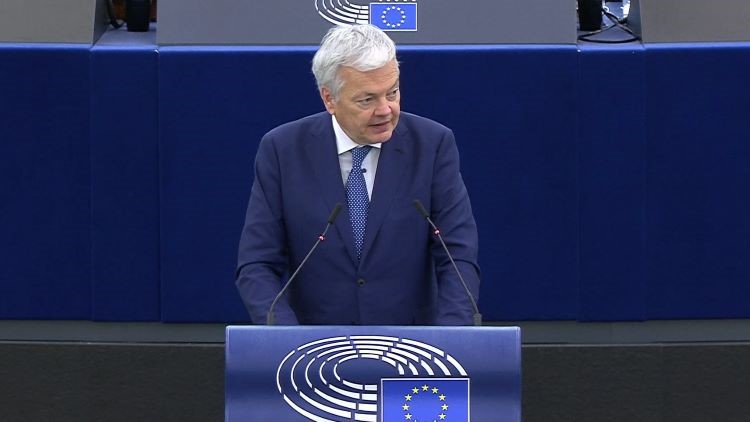Eduardo González
In the midst of a heated debate in the European Parliament led, above all, by Spanish MEPs, the Commissioner for Justice, Didier Reynders, said yesterday that the Commission will continue to examine “very carefully and independently and objectively” the amnesty law agreed by PSOE with Junts and ERC in the investiture negotiations and the State Secretary for Foreign Affairs, Ángeles Moreno, said that Spain “has always been committed to the separation of powers” and that, in any case, it is an “exclusively national” matter.
“The debate and analysis is going to happen first and foremost in Spain, within the Spanish constitutional framework,” Reynders said during the session. However, he warned, “the Commission, as guardian of treaties, must act” and will study the text “independently, objectively and carefully” to determine whether it is compatible with Community law and with respect for the fundamental values of the EU.
For this reason, he announced, the community legal services will make an analysis “when the final text is adopted by the Spanish Parliament” and includes the amendments that may be presented by the rest of the parliamentary groups during the process of processing the law. In any case, he assured, “the Commission maintains its position on the situation in Catalonia, which continues to be an internal situation that will have to be settled according to the Spanish constitutional order”.
In the same debate, Ángeles Moreno Bau assured that “Spain, as a Member State, has always been committed to the separation of powers and judicial independence” and warned that the amnesty is, “unequivocally, an internal Spanish constitutional issue” that must be “debated in the Spanish Parliament”. “An in-depth debate on an unapproved law of exclusive national competence does not contribute to improving European democracy; on the contrary, it shows worrying tendencies,” she said. According to Moreno Bau, “there are hardly any precedents” for debates on internal political issues in the European Parliament, but there are, on the other hand, for amnesty laws in European Union countries, including Spain.
The debate in the European Parliament was particularly harsh and brought out all the political polarization that Spain is currently experiencing, especially since the government agreement between PSOE and the Catalan pro-independence party Junts, which includes the amnesty law for those involved in the Catalan procès.
On the right, Dolors Montserrat, from the EPP, assured that her voice “is that of a Catalan who is astonished at the breakdown of democracy” and urged Europe to “listen to the voice of those who are against an amnesty that creates first and second class citizens”. Likewise, Adrián Vázquez, from Ciudadanos and from the parliamentary group Renovar Europa asked the socialists “not to frivolize with this issue because we already know how it ends”. “You have the opportunity today to continue defending the rule of law alongside us as in Hungary or Poland”, continued Vázquez, who affirmed that the government of Pedro Sánchez is -legitimate, but founded on a political agreement that initiates the blowing up of our rule of law”.
The harshest epithets came from the ultra-right-wing deputies of Vox, such as Hermann Tertsch, who stated that “what is happening in Spain is a coup d’état” and Jorge Buxadé, who declared that “the amnesty is a coup d’état, Stalin would be proud of Sánchez”. For his part, the leader of the EPP parliamentary group, Manfred Weber, stated that “Sánchez will go down in history as the one who broke the rule of law and Feijoó (Alberto Núñez Feijóo, president of the PP) as the one who saved the rule of law”.
On the part of the PSOE, the president of the Freedoms Commission and former Socialist Minister of Justice, Juan Fernando López Aguilar, assured that in Spain “there is no threat to judicial independence in Spain other than the rude blocking of the CGPJ by the PP” and assured that the amnesty law is a “singular” norm to resolve an “exceptional” crisis.
Likewise, the MEP Javi López assured that “the amnesty law is perfectly constitutional and fits perfectly in Europe” and the leader of the European Socialists, Iratxe García, asked “how can the PP boast of being the guarantor of the unity of Spain when during Rajoy’s government the greatest territorial crisis in the history of Spain took place” and “how can the PP defend democracy when today it sets the fuse to ultras groups and does not condemn the violence in front of socialist headquarters and the attacks on journalists”.







